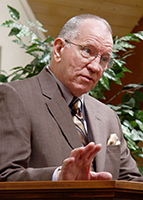I would like to set the framework by turning your attention briefly to Ephesians 6, beginning with verse 10 and reading down to the first words of verse 14. Coming to the end of his marvelous letter to the churches in the Ephesus area, Paul writes:
“Finally, be strong in the Lord and in the strength of his might. Put on the whole armor of God that you may be able to stand against the wiles of the devil. For our wrestling is not against flesh and blood but against the principalities, against the powers, against the world rulers of this darkness, against the spiritual hosts of wickedness in the heavenly places. Wherefore take up the whole armor of God that you may be able to withstand in the evil day, and having done all, to stand. Stand therefore.”
In these few verses, four times the apostle is exhorting the people of God to stand, to withstand. In other words, he pictures the Christian soldier clad in the armor provided by God not so much going into the enemy’s territory and gaining new ground in the name and for the cause of Christ, but standing his own ground against the principalities and powers that are trying to dislodge him from the territory on which he stands in the name of Christ. Surely that’s the imagery in this passage.
Continue reading The Worship of God: Purity, Dignity, and Vivacity




